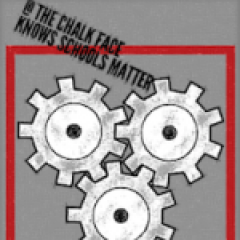Are Teachers Permitted to Have Expertise and Credentials?
This isn’t necessarily a rhetorical question, although the reader might have a different opinion. I’m happy to hear it. But the short answer to the title question is, “No, teachers are not permitted their expertise and credentials.”
Probably one of the best things I’ve ever read in education was this book-length study by sociologist Dan Lortie called Schoolteacher. It may have been originally published in the 1970s with some updates as recent as 2002. And there may be some better stuff out there, I don’t know. Ingersoll is another sociologist that seems to cut right to the heart of teacher professionalism, calling “teacher bashing” our new national pastime.
At one point, Lortie argues that teachers no longer have, or perhaps never had, a technical culture inaccessible to the layperson. For the sake of argument, let us assume that at some point, perhaps an unknown golden age in education, teachers were well-respected professionals with skills and knowledge only accessible to those who’ve undergone a period of training and apprenticeship. So, the detailed knowledge of planning, teaching, and curriculum was locked away somehow and required a foundation of skills to access it and use it properly.
This is assuming this even existed, which I’m sure Lortie would argue did not, ever. In any event, imagine this pent up expertise and technical knowledge as a giant stone block. Or, imagine it as a majestic marble or stone carving, a once mighty emperor of Rome or statue of a Pharaoh that adorned a great palace. Whatever. All right, so over time, the elements slowly erode this statue, ever so gradually, without protection. Pollution, weather, and war riddle it with pockmarks and smooth out the once carved edges until it barely resembles what it once was.
This is perhaps a bit dramatic, but I would argue that, if a golden age in teacher professionalism existed, it is now a withered, eroded shell of its former self. So many incidentals chipped away at its once glorious visage. Even in its attempted restoration, although well-meaning at times, rendered it worse than it was before.
There have been so may factors eroding teacher confidence and professionalism, it may be difficult to to pin it all down in a blog post. But I think I can come up with a couple of broad catalysts. It’s been an issue of power and control. Teaching is dominated by women. If teachers were intellectuals and professionals, and achieved full status as such, then our workforce would have an immediate influx of millions of new intellectuals and professionals demanding respect and fair wages. Can’t have that, right?
With that, if teaching is indeed better left to women, then it must be that there is something biologically inherent in a woman’s abilities that make her a better fit for the classroom. Sure, men can teach, but women are, according to this view, better. If teaching is biologically innate to some extent, than no amount of training or preparation or education can make one a completely effective teacher. Many of us can try, take classes, read books, but we’ll never truly make it. It’s better that we become principals or superintendents or something.
What does this do to teacher professionalism? Well, it perpetuates this slow erosion. If a good part of understanding classroom teaching is simply being a particular sex, than all women have something to say about teaching, and they have the credibility to say it. And I’m not talking about what is best for their own children. I do not quarrel with the fact that a parent might know their child better than others. But I get the impression that they are gifted the credibility to know what is right for ALL children, regardless of race, gender, sexual orientation, social class, ethnicity, religion, or any other identity.
If all it takes to be a parent of your own children to have the knowledge of ALL children, then what is the point of a professional educator? Seriously. As such, when a teacher touts their credentials, their Board certification, or what have you to affirm that they might know about education, it appears as if they are scolded or ridiculed for it. Do we do the same for lawyers, doctors, executives, or others with highly specialized knowledge? Does cleaning the wounds of your own child, or yourself, confer medical knowledge? I’ve read some legal documents in my day. Could I go to trial?
This is not meant to sound like a zero sum game, that one’s knowledge or expertise necessarily trumps another’s. All facets of expertise can enlighten a given situation or problem. But if we rely on experts in some fields to offer us insight into something we might not completely understand, then we must allow the same to be afforded to educators. Unfortunately, as Lortie argued, a technical culture of some kind would benefit the professionalism of educators so that they may enjoy the benefits and respect other professionals receive. This would do a great deal for educators in the long run.
But there are well-meaning folks, and some not so well-meaning, who seem to stop short at trusting educators with their judgments. And I’m not implying 100%. We’ve all gone to a doctor and thought of a second opinion. But maybe when I go to a doctor, I try to trust them 80%, maybe 75%? When it comes to an educator, overall, might be less than half.
Now, I don’t know if its educators who must impose such boundaries or they need assistance from the lay public in this regard. But some boundaries must be establish lest we lose the professional altogether. That might lead to the end of education degrees and preparation programs, of perhaps credentialing and certification altogether. Some who wish to profit from education certainly see advantages to the bar being lowered so far that anyone can teach. Therefore, anyone can be trained at whatever low cost necessary. But the rightful skeptics of teacher education, or those who advocate for improvements, of which I could be considered one, might want to limit their criticism to the extent that it calls for its complete eradication. It may have some unpredictable blowback that we’d won’t be able to rein in.
Food for thought.
This blog post has been shared by permission from the author.
Readers wishing to comment on the content are encouraged to do so via the link to the original post.
Find the original post here:
The views expressed by the blogger are not necessarily those of NEPC.

